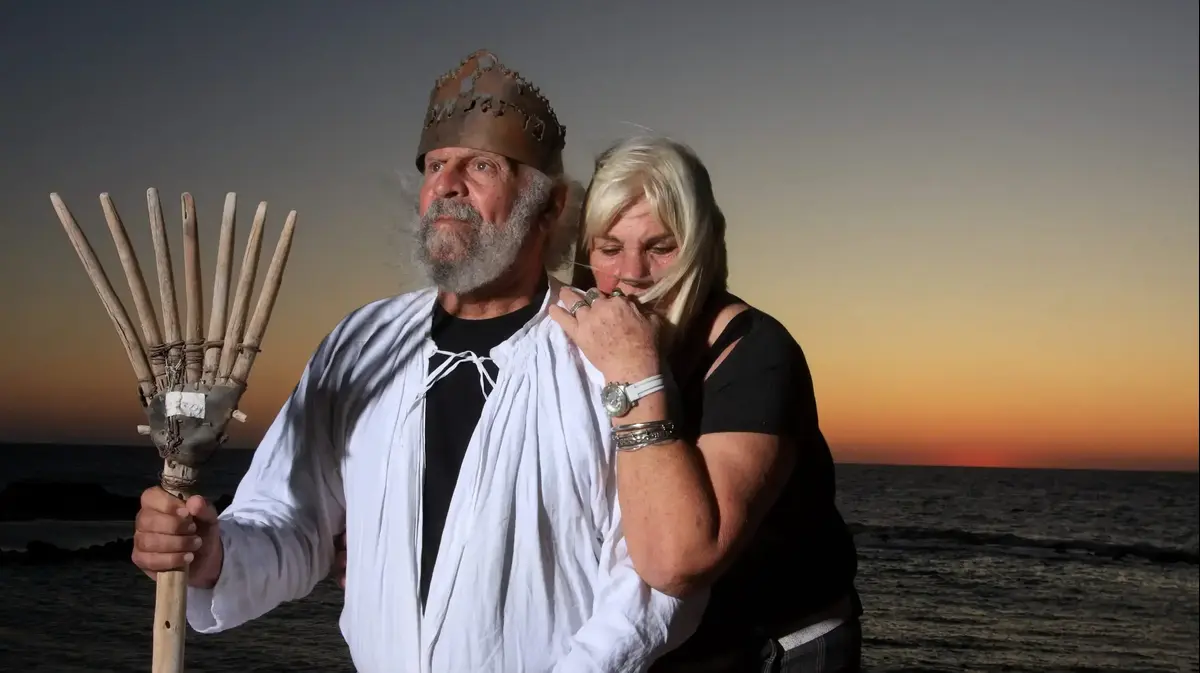news
News in Israel
Events in Israel
marching song
50 years of freedom: the last citizen of the state of Achziv
Rina Avivi abounds in stories about the village of Achziv that has become a center of attraction for artists, bohemians and young people who have sought freedom from conservative Israel, but are not captivated by nostalgia.
Three years after the death of her husband Eli, the president of the "State", she tries to preserve the spirit of the place, even though the guests are not required to pump water from a well as they once did
Tags
I will disappoint
Eli Avivi
Eli Ashkenazi
Saturday, 13 November 2021, 07:50
Share on Facebook
Share on WhatsApp
Share on general
Share on general
Share on Twitter
Share on Email
0 comments
As is the case with many newspapers and magazines, the weekly "This World" has not been with us for many years. One can only imagine what one of the covers of the anti-establishment weekly would have looked like over the past year on the occasion of the fiftieth year of "Achziv State," or to mark the seventieth year since Achziv the future president of the country arrived.
The ex-territory created by Eli Avivi on Achziv Beach and which announced its separation from the State of Israel in 1971 was one of the favorite subjects of Uri Avnery's weekly. Maybe the title was "Fifty Years of Freedom"? You may. On a picture of a topless woman sure they would not give up, as they always made sure to do in their articles on the disappointment of spring.
This week on the porch of her home, the only civilian of the state of Achziv sat, looking back with a sober look. Rina Avivi, the widow of Eli Avivi who passed away three and a half years ago, misses him, the energy and action that characterized the vibrant years of the "state."It abounds in stories about the colorful history of the place, but is not captivated by nostalgia.
More on Walla!
Negotiations on the maritime border with Lebanon are stalled, and many sides are on a map from a century ago
To the full article
More on Walla!
A resident of the Krayot went kayaking on Achziv beach - and crossed the border into Lebanon
When she is busy with a modern and advanced smartphone, Avivi admits that "this is not what it used to be. Today we are in different times. Until the 1980s we lived here without electricity and without running water. Today of course there is water, electricity, internet and some rooms even have TVs. "In the past, I can not tell the guests
who come to go and draw water from the well, as it used to be here."
Avivi still remembers with a smile the protest of the vacationers when the electricity came to the place, but despite the progress she thinks that what the journalist Menachem Talmei defined 62 years ago as a "feeling of disappointment" still exists.
Eli Avivi (Photo: Maariv, Yossi Aloni)
"A feeling of disappointment" according to Rina Avivi is the quiet that characterizes the place, the feeling of home and the lack of formality.
The beach is not as secluded as it was fifty years ago;
Construction, roads and transportation have changed beyond recognition, but says "there's still a different atmosphere, people come here say they feel they are abroad."
Resort recognized State of Achziv "is a creation of the late spring to me, and his wife, Rina .
A "feeling of disappointment" still exists.
Rina Avivi (Photo: Shlomi Gabay)
Avivi was born in Persia in 1930 and when he was a year old his parents immigrated to Eretz Israel with him and settled on Lavenda Street in Tel Aviv.
At the age of 16, Avivi enlisted in the Palmach naval company, the Palmach, and participated in various operational activities.
After the War of Independence he worked for a few years on merchant ships and reached the ends of the earth.
In 1952 he returned to Israel.
A few years later, he told journalist Menachem Talmi that "then he decided to find himself a remote and quiet corner, where he could live with maximum simplicity, away from the hustle and bustle of the world.
He came to visit the "IDF Moshav" which later became "Kfar Liman" and during his wanderings in the area ignited the Arab village of a-Zib which had been abandoned by its residents in the war a few years earlier.
1971 has become the most dramatic and significant year in the history of the place (Photo: Official Website, Archive of this World Website)
He rented a house from the absentee property manager and settled in the place, fed on fish from fish, cans that were ejected to the beach and from the water of the village well.
The Western Galilee region was not as densely populated as it is today and Avivi gained its peace and solitude she longed for.
In time, young people and passers-by began to arrive, looking for a place of refuge and peace of mind.
Several journalists also "discovered" the place and in one of the articles, Avivi was called "the loner from Achziv."
The media that likes to attach nicknames and labels has stuck to this nickname over the years.
The character of the loner disappoints has served his image well throughout the years he has struggled with an establishment that has tried to get him out of the abandoned village.
He was also sometimes referred to as "Don Quixote."
Naomi Shemer wrote "A Night at Achziv Beach" in his village.
Eli Avivi (Photo: Maariv, Yossi Aloni)
Avivi stuck to the place and managed to hold on to Achziv. Alongside the endless letters he wrote and sent to the heads of state, he collected and treasured the antiquities of Achziv and presented them to the critics. His presence also prevented the demolition of some old houses. One can only think of such a figure who would have protected ancient Tiberias, for example, and prevented the destruction of historic buildings and left its antiquities in their original place, for the visitors who come.
Avivi's village has become an attraction for artists, bohemians and young people who have sought some freedom from conservative and puritanical Israel. Works were written on the spot and on it; Naomi Shemer, who experienced a sad night there, wrote "A Night at Achziv Beach" (the wind and the darkness and the water / remember your step from last night) and Yehuda Amichai, who was a member of the family, wrote songs in it that he defined as "Achziv songs".
1971 became the most dramatic and significant year in the history of the place;
That year began with the landing of a boat carrying six terrorists.
One version spoke of a Fatah squad sent to establish a spy network in the Galilee.
Another version said that the members of the cell intended to kidnap Eli Avivi both as a bargaining chip and as an attempt to harm those who were assisted by the security establishment in Israel.
One can guess that those who actually found a partner in Israel rather than an enemy would sometimes come to the small bay below the village.
Over the years, a status quo has been achieved between the "State of Achziv" and the State of Israel (Photo: Official Website, Historical Jewish Press of the National Library and Tel Aviv University)
The Avivi couple, armed with a rifle Carl Gustav and a pistol, took over the squad commander. The "Lupsi" bitch stood next to them. Rina remembers that night with a smile. "The terrorist was wearing a wetsuit. He was sitting with us at home and I made him a cup of hot tea. He was quite frightened. Then came the Border Police, Golani, paratroopers. The whole army was here. Five more terrorists were captured. The picture I especially remember from that event is of "A lot of seagulls who came to the terrorists' zodiac in the morning. They had an RPG project and a sack full of pitas that were enough for a band of hundreds of seagulls."
As in the neighboring country, Israel, a defensive force was established in Achziv, followed by the establishment of a state; In April 1971, after another round of clashes with the planning institutions and the Sulam Tzur Regional Council, the Avivi couple announced their separation from the State of Israel and the establishment of a "state of Achziv."
Joel Der, a reporter for the Davar newspaper who arrived at the scene, reported that "at the entrance to the new country, a mast was installed by hairy volunteers and above it was a tank top and a portrait of an apple picker was painted on it. This is the flag of the new country." "Here's Achziv State, show passport '".
What was born as a step that came to defy shocked the spirit of the place and served the extra-territorial image that clung to disappointment.
The infiltration of the terrorists and the "declaration of independence" brought much publicity to the place.
Many critics began to arrive and the world media also showed great interest.
It is not clear whether the terrorists came to kidnap Eli or deploy a spy network in the Galilee (Photo: Official website, Archive of this world website)
Later that year, Eli and Rina Avivi organized a festival in the spirit of Woodstock.
Then young couples came to the place and asked Avivi to perform marriage ceremonies for them and he agreed.
The establishment did not like it.
Police arrived at the scene and opened investigation files following the marriage ceremonies and even sought to deport from the country a Swiss couple whom Avivi Hatan.
Over the years, a status quo has been achieved between the "State of Achziv" and the State of Israel.
The demonstrative step began to serve the image of the place.
"The first country in the region to recognize Israel," the couple humorously wrote in publications for a music festival they held.
Another time they made headlines when they announced the appointment of an ambassador on behalf of their country.
"People who come in here say they feel like they are abroad." Rina Avivi's house (Photo: Shlomi Gabay)
"There have been interesting years," says Rina Avivi as the cat Jalal, who bears the name of Eli's father, stretches his body on a nearby chair.
Guests still arrive, especially on weekends.
The headlines and storms are not lacking for her.
She admits that the great publicity has not only served the media in the past, she and Eli have also benefited from it.
Today is good for her with the quiet that rules the place.
His only thing she worries about is that the promise made to her will be fulfilled - that one day, when she will no longer be here, the Mukhtar house that houses the Museum of Antiquities and the Achziv State Heritage will continue to exist and remind future generations of the unique spirit of "feeling disappointed".
Share on Facebook
Share on WhatsApp
Share on general
Share on general
Share on Twitter
Share on Email
0 comments



/cloudfront-eu-central-1.images.arcpublishing.com/prisa/AMBABVJIZHEE6NLMK73CXTWI5I.jpg)











